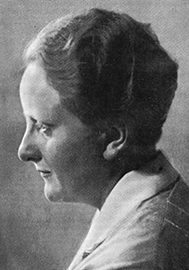Search for Names, Places and Biographies
Already layed Stumbling Stones
Suche
Martha Muchow * 1892
Edmund-Siemers-Allee 1 (Hauptgebäude Universität Hamburg) (Eimsbüttel, Rotherbaum)
HIER LEHRTE
MARTHA MUCHOW
JG. 1892
GEDEMÜTIGT / ENTRECHTET
FLUCHT IN DEN TOD
29.9.1933
- http:/
/ www.uni-hamburg.de/ Aktuelles/ stolpersteine_einladung.html
(Feierstunde anlässlich der Verlegung von zehn "Stolpersteinen" für die Opfer des Nationalsozialismus an der Hamburger Universität ) - http:/
/ www.uni-hamburg.de/ fachbereiche-einrichtungen/ fak_4/ bibliothek/ muchow.html
(Wer war Martha Muchow? - Universität Hamburg) - www.garten-der-frauen.de
(Im Garten der Frauen auf dem Ohlsdorfer Friedhof in Hamburg befinden sich einige Grabsteine von und Erinnerungssteine für weibliche(n) Opfer(n) des Nationalsozialismus, für die in Hamburg Stolpersteine verlegt wurden.)
further stumbling stones in Edmund-Siemers-Allee 1 (Hauptgebäude Universität Hamburg):
Raphael Broches, Ernst Delbanco, Friedrich Geussenhainer, Hedwig Klein, Agathe Lasch, Gerhard Lassar, Hans Konrad Leipelt, Reinhold Meyer, Kurt Perels, Margaretha Rothe
Martha Marie Muchow, born on 25 Sept. 1892 in Hamburg, suicide on 29 Sept. 1933
Bundesstrasse 74 / Edmund-Siemers-Allee 1, Rotherbaum
The psychologist and pedagogue Martha Muchow, who worked at the University of Hamburg, is commemorated in a variety of ways in Hamburg. There are not only the two Stolpersteine in front of the main university building and her residential building; the Faculty Library for Educational Studies, Psychology, and Kinesiology has also been bearing her name since 2007; a street in the Uhlenhorst quarter was named in her honor in 2010; Martha-Muchow-Weg; and in the "Garden of Women” ("Garten der Frauen”) in the Ohlsdorf Cemetery, a memorial stone in the "Memory Spiral” ("Erinnerungsspirale”) refers to her as well.
Martha Muchow was a native of Hamburg. Her parents were the Protestant customs inspector Johannes Joachim Heinrich Muchow and his wife Johanne Sophie Dorothee, née Korff. Since 1892, when Martha was born, the family lived at Zollvereinsstrasse 15 in what is today Rothenburgsort, and in 1900, when the only brother, Hans Heinrich (1900–1981), was born, at Stellinger Weg 8 in Eimsbüttel. Martha attended the eight-grade elementary school (Volksschule), a private girls’ secondary school in Hamburg, and then the municipal girls’ junior high school (Lyzeum) and the girls’ senior high school (Oberlyzeum) in Altona, where she took her high school graduation exam (Reifeprüfung) in 1912. The following year she passed the examination qualifying her for the teaching profession (Lehramtsprüfung). Subsequently, she taught at a girls’ secondary school in Tondern and from 1915 onward, after her return to Hamburg, at eight-grade elementary schools in Barmbek and Eimsbüttel. Since May 1916, she worked, in addition to her teaching duties, without pay as an academic supernumerary at the Psychological Laboratory, established in connection with general lecturing (Allgemeines Vorlesungswesens) at the Colonial Institute (Kolonialinstitut) and headed by William Stern. In the 1919 summer semester, she began studying psychology, philosophy, and German as one of the first female students at the new University of Hamburg. In 1920, she was granted leave from teaching duties at school, obtaining her doctoral degree in 1923.
Martha Muchow was committed to more progressive pedagogics and actively involved in the "people’s houses movement” ("Volksheimbewegung”). Starting in 1926, when the University of Hamburg took over the training of future elementary school teachers, she found a field of activity there. Since 1927, she also had teaching assignments at the Hamburg Fröbelseminar, and she maintained contact to the "Fröbel Movement.” Her major area of interest and research field was children’s lifeworlds in the big city. In 1930, she was appointed Akademischer Rat (lecturer with civil servant status). In 1930/31, she undertook an extended research trip to the USA, also giving lectures there.
From the very beginning, she was well aware of the consequences arising from the Nazi seizure of power, and she was in great despair about it – after all, there were instances of persecution, arrests, and suicides in her circle of acquaintances. In Apr. 1933, her teacher, Prof. William Stern, who came from an assimilated Jewish family, was locked out of the Psychology Institute. Martha Muchow then headed the institute on a temporary basis, though having to hand over this post to the education researcher Gustav Deuchler and leave the institute. The authorities wished her to return to teaching at school. In his essay on her, Walter Thorun quotes Martha Muchow’s brother:
"After the forced departure of William Stern, my sister saw herself confronted with numerous personal slurs. The defamations targeted her work at the ‘Jewish institute,’ where ‘everything’ was, after all, supposedly ‘related by blood or by marriage’ [‘alles verschwägert und versippt’]. When I addressed this defamation and its possible sources in a conversation with the new Nazi institutional director, Deuchler, the gentleman acted the unsuspecting part. – After my sister had handed over the institute to Deuchler, she acted very quickly. We did get one last call from Professor Stern. In the last conversation he had with my sister, she had already made allusions to that effect. When we drove to her apartment und eventually had her door forced open, she lay there collapsed in front of the gas range, having slit her wrists.”
Translator: Erwin Fink
Kindly supported by the Hermann Reemtsma Stiftung, Hamburg.
Stand: October 2017
© Susanne Lohmeyer
Quellen: StaH 332-5, 2300 + 1891/1892; Walter Thorun, "Martha Muchow (1892–1933) – Opfer ihrer Überzeugung", in: "Hamburgische Notizen der Patriotischen Gesellschaft von 1765", Mai–August 2003; Rainer Nicolaysen und Melanie Pieper, Muchow, Martha, in: Hamburgische Biografie, Bd. 6, S. 221f.; HAB III 1900; HAB II 1933.


